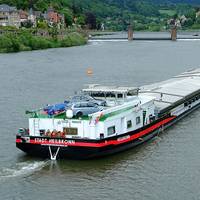EPA Announces Funding to Reduce Diesel Emissions
Preference given to fleets in areas facing air quality challenges. The U.S. Environmental Protection Agency (EPA) announced the availability of grant funding to modernize the nation’s diesel fleet by retrofitting or replacing vehicles with cleaner, more efficient diesel engines. EPA anticipates awarding approximately $40 million in Diesel Emission Reduction Program (DERA) grant funding to eligible applicants, subject to the availability of funds. “These grants will incentivize improvements to aging diesel fleets and improve air quality throughout the country,” said EPA Administrator Scott Pruitt. “Steps to reduce emissions from older diesel trucks are some of the most cost-effective measures we can take to improve the air Americans breathe,” said Rep. Ken Calvert (CA-42).
EPA Awards 10th Grader for Work on Marine Oil Spills

Oregon 10th grader Sahil Veeramoney received the U.S. Environmental Protection Agency (EPA), Region 10 President’s Environmental Youth Award for his development of a novel and efficient method to clean up marine oil spills. Veeramoney, a student at Oregon Episcopal School in Portland, Oregon, developed a method to remediate marine oil spills after studying the environmental impact of the 2010 Deepwater Horizon oil spill that occurred in the Gulf of Mexico and subsequent oil spills.
Port of Tacoma Settles Environmental Violations
The Port of Tacoma and two contractors have agreed to pay a $500,000 penalty and restore wetland habitat at an estimated cost of over $3 million to compensate for alleged violations of the Clean Water Act that damaged valuable Puget Sound wetlands, according to a settlement with the U.S. Environmental Protection Agency and U.S. Department of Justice. The proposed settlement has been filed with the court and the public will have 30 days to provide comments, which the court will consider before the settlement is approved. In 2008, EPA and the U.S. Army Corps of Engineers discovered that the Port of Tacoma hired a contractor to raze vegetation and destroyed more than four acres of wetlands in Hylebos Marsh…
German Waterways Strike: 150 Barges Held Up

More than 150 barges are anchored at or near locks in western Germany's river and canal systems hit by a lock workers strike, report Platts, citing the German waterway shipping lobby BDB and German shipping firm sources. The German waterway system has 435 locks, the lion's share in western Germany. The small number in eastern Germany have been excluded from the strikes because of massive recovery work from last month's catastrophic flooding there. The west German strikes, called by the country's service workers union Ver.di…
TOTE Ships to Reduce Emissions by 90%
Nearly $1.5m in grant money recently awarded to the Port of Tacoma will empower Totem Ocean Trailer Express, Inc. (TOTE) to reduce the particulate matter and greenhouse gas emissions of its two Orca Class vessels by an estimated 90 percent while at TOTE’s Tacoma terminal. The emissions reduction will be the end result of the Port of Tacoma adding 600,000 volt electrical maritime power at the terminal and TOTE retrofitting both vessels with electrical power plug-ins. This will allow the ships to turn their engines off while docked, eliminating at-berth diesel idling. Each vessel calls on the Port of Tacoma one time per week for about 12 hours.
Washington State Ferries to Shift to Clean Fuel Initiative
Washington State Ferries (WSF)/Washington State Department of Transportation (WSDOT) will shift the entire ferry fleet to low-sulfur diesel fuel, test ultra-low sulfur diesel fuel, and test biodiesel fuel—all steps that will improve air quality by reducing the amount of harmful substances in the ferries’ diesel fuel exhaust. The ferry system also has upgraded its vessels with more-efficient engines and made operational changes that have reduced fuel consumption and emissions, and will continue seeking new ways to improve fuel efficiency. As a result of all these changes, nearly 10,000 fewer tons of pollutants will be released into the air by ferry fuel emissions.
HAL to Conduct Air Emission Reducing Study
To determine the feasibility of new technology designed to dramatically reduce air emissions on seagoing vessels, Holland America Line plans on conducting a seawater scrubber feasibility project aboard one of its cruise ships thanks to the assistance of a $300,000 EPA/West Coast Collaborative grant and $100,000 contribution from Puget Sound Clean Air Agency. The total cost of the installation is more than $1.2 million. This innovative project is intended to demonstrate how advanced seawater scrubbing reduces air emissions on large oceangoing vessels. The results will determine whether this technology could be rolled out to new oceangoing vessels, as well as retrofitting existing vessels.





